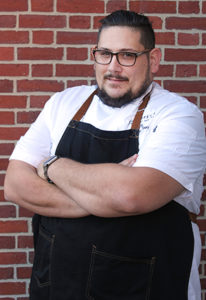Bon Appétit-Served Universities Win New England Food Vision Prizes

By helping a Rhode Island cheesemaker dramatically ramp up mozzarella production, the Food Vision Prize will also help struggling New England dairy farms
Local food purchasing just took a big leap forward in New England.
Brown University (working with Roger Williams University) and the Massachusetts Institute of Technology (working with Lesley University and Emmanuel College) are among the 2019 winners of the Henry P. Kendall Foundation’s New England Food Vision Prize, an effort to encourage college and university campuses in the region to improve the health, sustainability, and vitality of the region’s food system.
This marks the second annual round of prizes, in which food service leaders from the region’s 200 college and university campuses submit bold ideas aimed at increasing the amount of regionally produced food on campus menus. Each of the six teams of winners will receive an award of up to $250,000 to begin implementation of their project.
“I am extremely proud of the five Bon Appétit teams for working together and coming up with these innovative ways to help our Farm to Fork farmers and bring even more local foods to their campuses,” said Regional Vice President Elaine Smart. “We are grateful to the Kendall Foundation for this tremendous opportunity.”
Hanging by a Shred: Supporting Regional Dairy Farms Through Increased Shredded Cheese Production
The idea is a simple one: “This local cheese producer makes an excellent mozzarella, but they’ve never had the capability to shred it for us,” explains Ty Paup, Bon Appétit Director of Culinary Operations at Brown University in Providence, RI. The Food Vision Prize funds will help purchase the equipment that Providence-based Narragansett Creamery needs to be able to supply shredded mozzarella for not only Brown but also the Bon Appétit team at Roger Williams University in Bristol, RI, and others. “We use well over 10,000 pounds of shredded cheese a year for pizza, so we are thrilled to be able to move that spend over to a great Farm to Fork partner,” says Ty.
“This local cheese producer makes an excellent mozzarella but never had the capability to shred it for us. We use well over 10,000 pounds of shredded cheese a year for pizza, so we are thrilled to be able to move that spend over to a great Farm to Fork partner.” — Ty Paup, Bon Appétit Director of Culinary Operations at Brown University
The implications of this simple purchase are far-reaching. As Narragansett Creamery grows this capacity, it can service other institutional customers in the region. This impacts not only the local cheese market, but also the local milk supply. Cheesemaking requires approximately eight times as much milk as does using milk directly, such as in baked goods or for drinking. This project will increase the amount of local cheese produced within the region, and therefore exponentially increase the amount of local milk produced and utilized, helping the struggling New England dairy industry. (Learn more.)
Transforming Surplus into Stability and Scale
When Manager of Strategic Initiatives Nicole Tocco Cardwell met with Bon Appétit’s leadership at Massachusetts Institute of Technology (Cambridge, MA), Lesley University (Cambridge, MA), and Emmanuel College (Boston) to brainstorm a joint project for the 2019 New England Food Vision Prize, they began with a basic assumption: Bon Appétit teams and their university clients want to purchase more local food, and local farmers and fisheries want to sell their product to colleges in the region. And yet 20 years after the Farm to Fork program was launched, there remain significant challenges within the supply chain, such as seasonal shortages, pricing, and inconsistent product quality, that no single entity within a supply chain can resolve.
So the MIT, Lesley, and Emmanuel College teams have partnered with CommonWealth Kitchen, Western Massachusetts Food Processing Center, Boston Area Gleaners, and Pioneer Valley Grows to create a portfolio of “Food From Here” products that will be utilized across campus kitchens, retail locations, residential halls, and convenience stores. Chefs will work with the processing partners to analyze campus menus and recommend products for the “Food From Here” portfolio. These partners, along with Boston Area Gleaners, will identify local suppliers, who will receive the support they need to become a part of the supply chain. (Learn more.)
